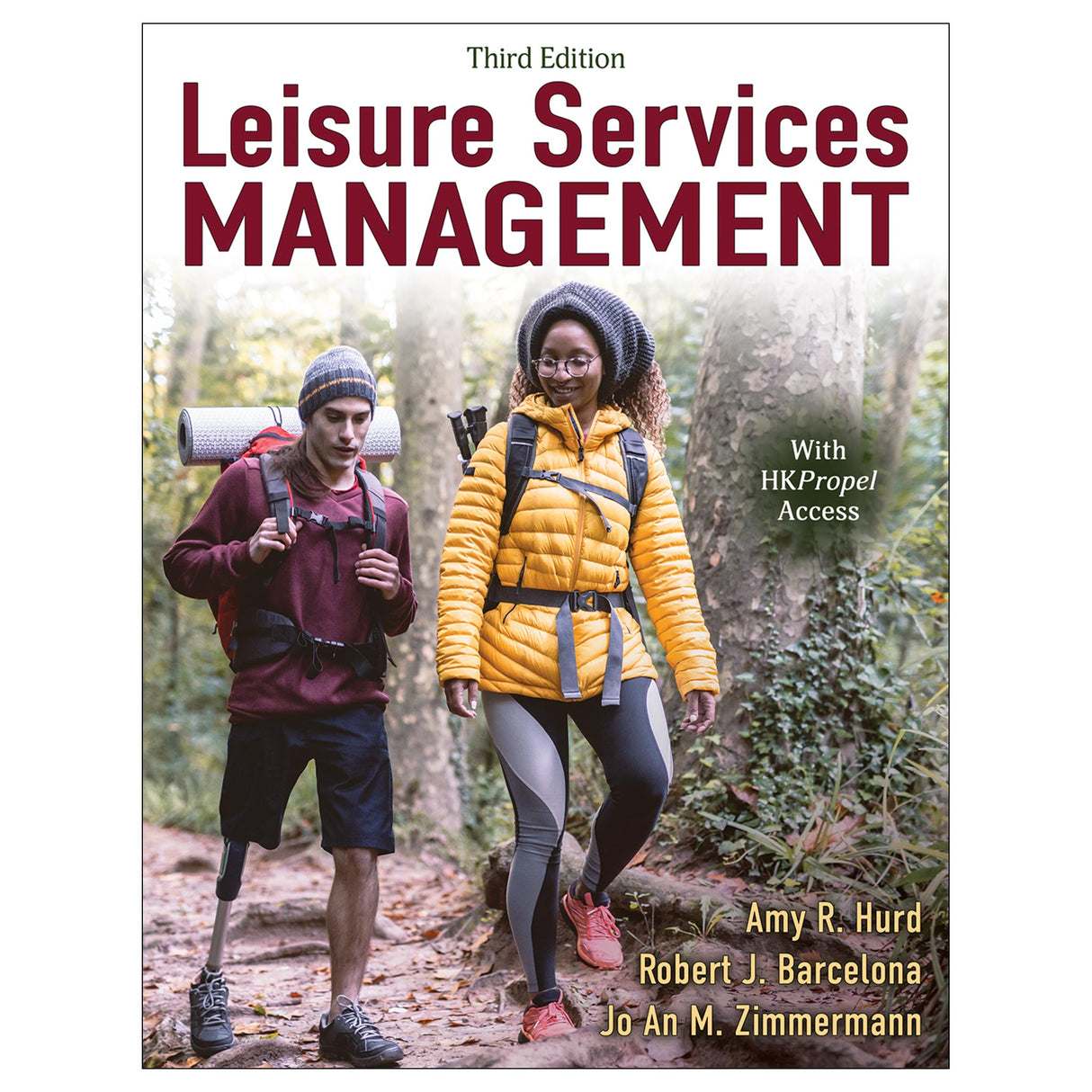Leisure Services Management 3rd Edition With HKPropel Access
$119.00 USD
Leisure Services Management begins by presenting a firm foundation of competency-based management. Students will examine the scope of leisure management, management responsibilities, and how a manager can affect an agency and its customers. They will also explore specific management areas such as marketing, financial management, human resources, employee development, communication, and evaluation.
For each chapter, the ancillaries offer experiential learning activities that simulate on-the-job situations. Each of these activities asks students to assume the role of a manager and address common management issues by completing a work assignment or project. These activities will facilitate student development and help students gain essential management competencies. Other learning aids include learning objectives, review questions, key terms, and a glossary to reinforce student learning.
In addition to updated references that provide contemporary management perspectives, the third edition features the following:
- Expanded content on social media, planning, and international leisure
- A new chapter focusing on diversity, equity, and inclusion to broaden students’ perspectives
- From the Field sidebars, which offer readers a glimpse of what happens in the field, so they can better understand what they will be facing in the future
The competency-driven approach of Leisure Services Management, Third Edition, assists readers in gaining the knowledge and practicing the skills needed to begin a career in leisure management. Bolstered by the practical information in this text, new managers can contribute to the success of their organization as they enjoy the challenges and rewards of their career.
Note: A code for accessing HKPropel is included with all new print books.
Audience
Upper undergraduate- and graduate-level students taking recreation and leisure management courses; reference for recreation and leisure professionals, including those seeking Certified Park and Recreation Professional (CPRP) certification.What Is Management?
Management Theories and Systems
Management Trends
A Competency-Based Approach
Conclusion
Chapter 2. The Management Process
The Management Process
Management Drivers
The Manager’s Resources
Management Functions and Career Progression
Outcomes
Critical Management Issues
Conclusion
Chapter 3. Diversity, Equity, and Inclusion
What Is Diversity and How Does It Affect Our Experiences?
Equity and Equality
Inclusion
Why Diversity, Equity, and Inclusion Matter
Interpersonal and Systemic Challenges
Personnel and Workplace Challenges
Strategies for Advancing DEI in the Workplace
Reducing Prejudice and Building Competencies for Addressing Interpersonal and Systemic Challenges
Conclusion
Chapter 4. Organizational Structure
Three Sectors
Organizational Structure, Design, and Culture
Working With Boards
Form of Government and Organizational Structure and Design
Internal and External Politics
Conclusion
Chapter 5. Coordination of Resources, Programs, and Services
Internal Organizational Coordination
External Organizational Coordination
Conclusion
Chapter 6. Planning and Decision Making
Planning
Elements of Master, Comprehensive Master, and Strategic Planning
Problem Solving and Decision Making
Ethical Decision Making
Conclusion
Chapter 7. Marketing and Public Relations
Definition and History of Marketing
Market Segmentation and Target Marketing
Marketing Mix
Social Media
Conclusion
Chapter 8. Communication and Customers
Functions of Communication
Communication Process
Communication Breakdowns
Strategic Approach to Communication
Internal Communication
External Communication
Conclusion
Chapter 9. Personnel Procedures and Practices
Human Resources Perspectives
Personnel Planning
Personnel Processes
Managing Volunteers
Conclusion
Chapter 10. Staff Retention and Development
Onboarding
Employee Engagement and Development
Motivation
Employee Recognition
Performance Appraisal
Discipline
Conclusion
Chapter 11. Sources and Methods of Financing
Sources of Revenue
Expenditures
Pricing
Pricing Trends and Issues
Conclusion
Chapter 12. Budgets and Financial Cost Analysis
Defining Budgets
Budget Cycle
Cutback Management
Types of Budgets
Approaches to Budgeting
Budget Implementation
Financial Analysis and Reporting
Conclusion
Chapter 13. Evaluation
Why Evaluate?
Performance Measurement
How to Evaluate
Selecting Evaluation Participants
Best Practices and Benchmarking
Conclusion
Appendix A. Certified Park and Recreation Professional (CPRP) Competencies
Appendix B. One-Page Strategic Plan, City of Fairfax, Virginia
Grow your organization through social media engagement
Reducing Prejudice and Building Competencies for Addressing Interpersonal and Systemic Challenges
Take a competency-based approach to management
All ancillaries are free to adopting instructors through HKPropel.
Instructor guide. Includes a sample course syllabus, chapter outlines, learning objectives, the activities and case studies provided to students, an introductory activity for the competency scorecard, and links to sample forms that are typical of the documents learners will encounter in their future jobs.
Test package. Contains 350 questions in true-false, matching, essay, and multiple-choice formats. The files may be downloaded for integration with a learning management system or printed for use as paper-based tests. Instructors may also create their own customized quizzes or tests from the test bank questions to assign to students directly through HKPropel. Multiple-choice and true-false questions are automatically graded, and instructors can review student scores in the platform.
Chapter quizzes. Contains ready-made quizzes (9-10 questions each) to assess student comprehension of the most important concepts in each chapter. Each quiz may be downloaded or assigned to students directly through HKPropel. The chapter assessments are automatically graded, and instructors can review student scores in the platform.
Presentation package. Features more than 290 PowerPoint slides of text, artwork, and tables from the book that can be used for class discussion and presentation. The slides in the presentation package can be used directly within PowerPoint or printed to make handouts for students. Instructors can easily add, modify, and rearrange the order of the slides.
Instructors also receive access to all student materials in HKPropel. For Leisure Services Management, this includes the list of competencies tested in the Certified Park and Recreation Professional (CPRP) exam to help learners better understand what will be expected of them, plus a competency scorecard, undergraduate- and graduate-level case studies for each chapter, and links to websites.





